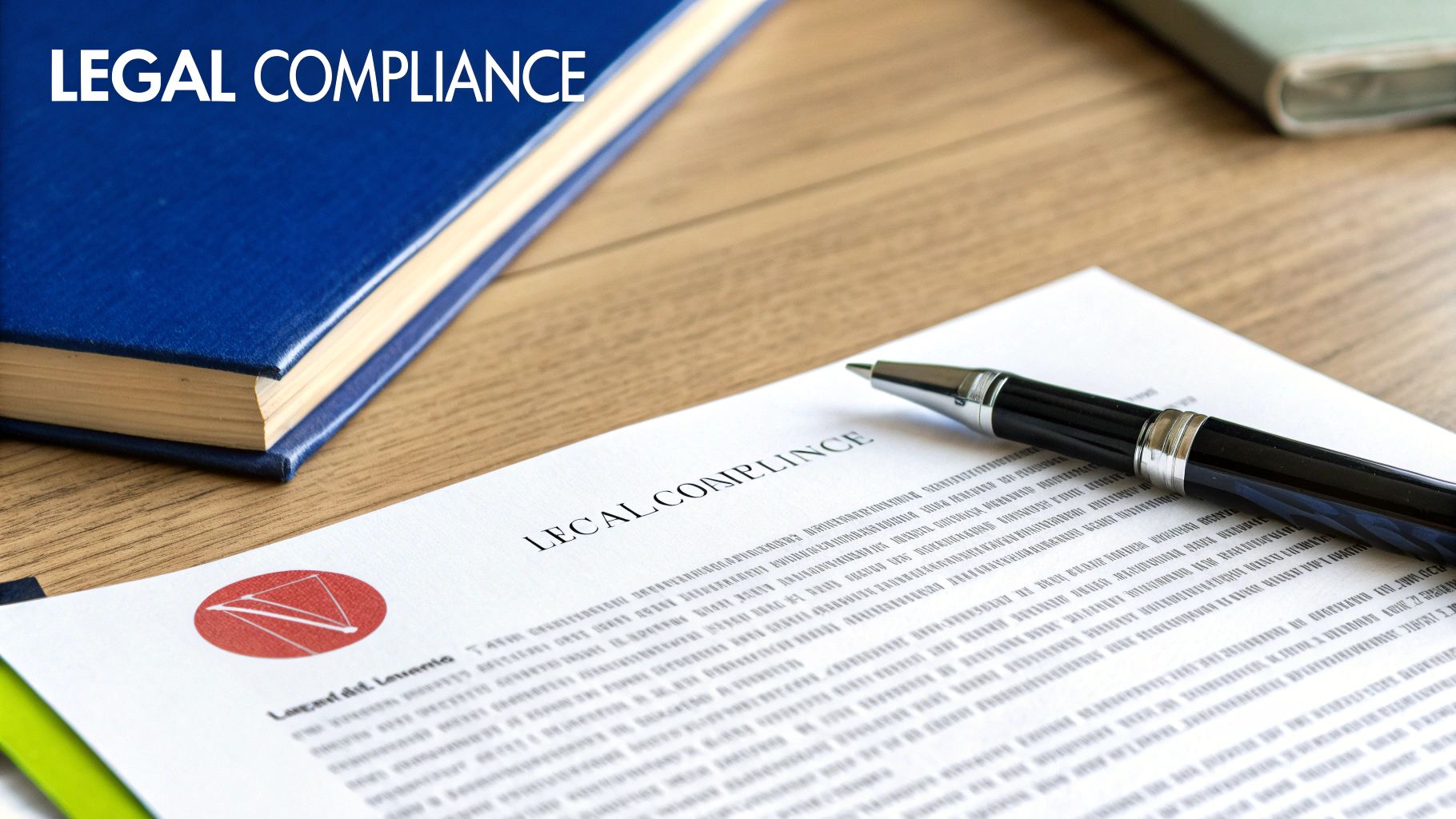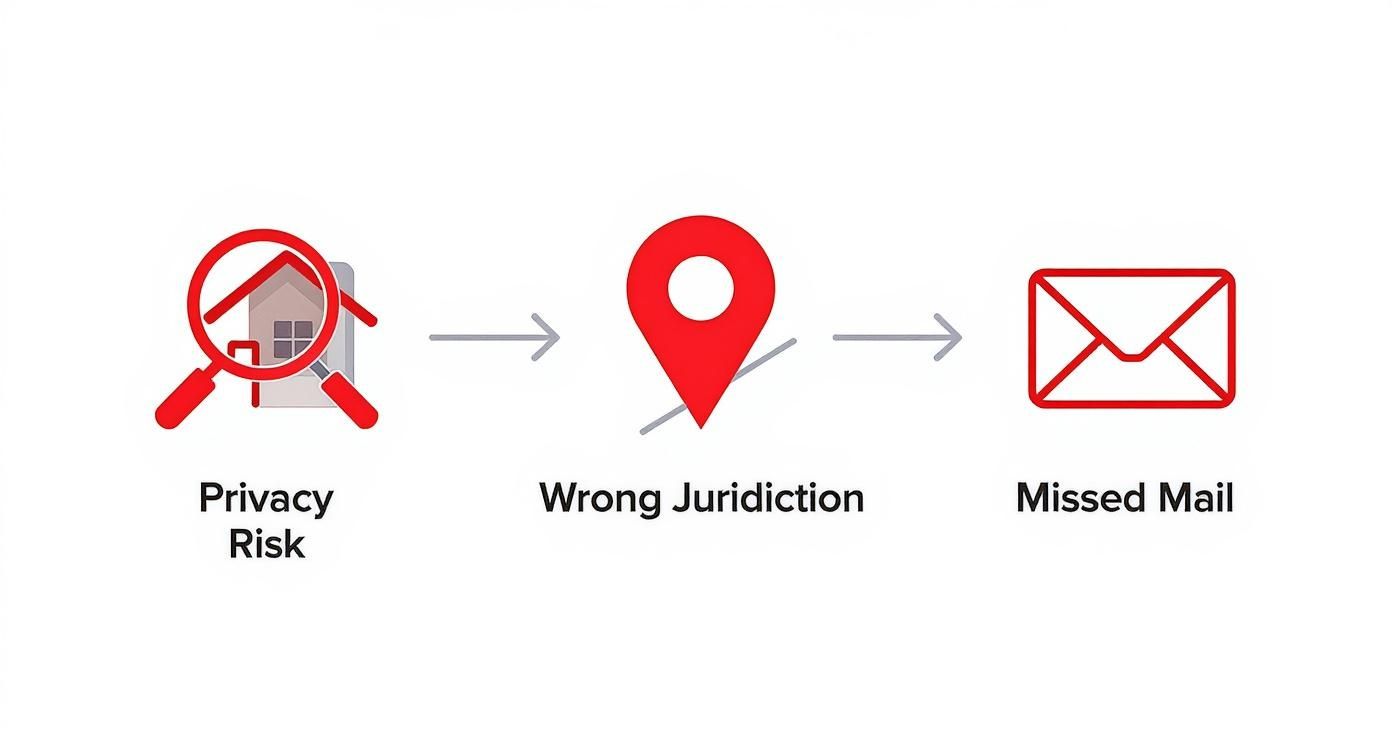Your Guide to a Director Service Address
Your guide to registered office address – When you set up a limited company in the UK, one of the very first things you’ll need is a registered business address. This isn’t just any old address; it’s your company’s official, public-facing address used by Companies House and HMRC for all legal notices and statutory mail.
It’s a non-negotiable legal requirement, but here’s the key thing to remember: it doesn’t have to be where you actually do your work.
What Is a Registered Business Address?

Think of your company’s registered address as its official home on paper. It’s the single, recognised location where government bodies will send important documents, from tax reminders right through to legal summons.
Crucially, this address is placed on the public register. That means it’s visible to clients, suppliers, and absolutely anyone who decides to search for your company online.
This is a really important distinction for new business owners to get their heads around. For example, you might be running a booming e-commerce empire from your spare room, meeting clients at a swanky coworking space, or crafting products in a workshop. None of these has to be your registered address. This separation provides flexibility and privacy.
The Role of a Formal Address
So, why the fuss? The primary role of this address is to ensure there’s always a reliable, physical location where official notices can be legally served. It acts as a permanent, stable point of contact between your business and the authorities. An actionable insight here is to treat this address as your official ‘inbox’ for government correspondence; it must be monitored regularly.
Without this formal address, there’d be no guaranteed way for regulatory bodies to communicate with a company. It would be chaos. This simple requirement underpins the entire system of corporate accountability we have in the UK, which is why every new business must declare one when they incorporate.
A registered address is more than just a line on a form; it’s the anchor that legally tethers your business to a specific jurisdiction within the UK. It dictates which laws your company is governed by and where legal proceedings would take place.
A Growing Requirement for New Businesses
The need for a compliant registered address is more relevant than ever. In the financial year ending March 2025, the UK saw a staggering 890,500 new companies formed, which is a jump of 11.2% from the previous year.
Every single one of these new ventures had to provide a valid registered address, cementing its role as a foundational step in the business world. You can find more insights in the latest UK company formation trends and see the trends for yourself.
Understanding Your Legal Obligations

Choosing a registered address isn’t just about ticking a box on a form. It’s a serious legal commitment, and Companies House has strict rules you need to follow. Getting this right is fundamental to keeping your company in good standing and avoiding some pretty hefty penalties.
The most crucial rule is that your registered address must be a physical location somewhere in the United Kingdom. This is non-negotiable. It means you can’t just use a standard Post Office (PO) Box number, because official mail and legal notices need to be delivered to an actual, physical premises where someone can accept them.
On top of that, your address must fall within the correct legal jurisdiction where your company was incorporated. The UK is split into three distinct jurisdictions for company law, and you can’t mix them up.
The professional registered office service from Acorn Business Solutions will ensure you meet all your statutory requirements.
The Jurisdictional Rules Explained
Every company is legally tied to the jurisdiction where it was first registered. This directly dictates where your official address can be located. It’s a simple but vital detail.
The three jurisdictions are:
- England and Wales: If your company is registered here, its address must be in either England or Wales.
- Scotland: A Scottish-registered company needs to maintain a registered address in Scotland.
- Northern Ireland: A company incorporated in Northern Ireland must keep its registered address there.
You absolutely cannot chop and change. A company set up in Scotland, for instance, is not allowed to use a prestigious London address for its official registration. The address has to stay within Scottish borders to be compliant.
This is a classic trip-up for new business owners. For example, a tech startup founder in Glasgow might see an attractive virtual office package based in London’s “Silicon Roundabout” and sign up, only to find it’s invalid for their Scottish-registered company. It’s also worth remembering this address is totally separate from your personal contact details. If you’re a director, you have different rules to follow, which we cover in your guide to a Director Service Address.
Consequences of Non-Compliance
Failing to meet these obligations isn’t something you can brush under the carpet. Companies House actively enforces these rules, and pleading ignorance won’t get you very far. The consequences can seriously disrupt, or even end, your business.
If your company fails to maintain a valid registered address, Companies House has the authority to begin the process of striking it from the official register. This effectively means your business could cease to legally exist.
Beyond that ultimate penalty, you could also be looking at significant fines and legal action against the company directors personally. It also sends a terrible signal to clients, partners, and the authorities, suggesting the business isn’t being run properly.
Making sure your registered address of business is always valid, current, and in the right location isn’t just admin—it’s a cornerstone of good corporate governance.
The professional registered office service from Acorn Business Solutions will ensure you meet all your statutory requirements.
Choosing Your Address for Strategic Advantage

Your registered address is so much more than a box to tick on a form. It’s one of the first things a potential client, investor, or partner sees, and it quietly shapes their perception of your business. Think of it less as a legal necessity and more as a powerful tool in your brand’s arsenal.
Choosing this address isn’t just an admin task; it’s a strategic move. A prestigious commercial address can instantly signal that your business is established and credible. For a startup or a sole trader, this small detail can be the difference-maker, giving you a serious edge over competitors from day one.
Top Tip – Portray a professional image with a dedicated registered office address in Manchester quickly avoiding the hugely over subscribed services of central London.
Building Credibility and Trust
First impressions count, especially in business. Let’s say a freelance consultant is pitching for a big corporate contract. If their company is registered at a well-known business centre in a major city, it immediately projects an image of professionalism and reliability.
Now, imagine a competitor is registered at a residential address. It might unintentionally make them seem smaller-scale or less established, even if their work is top-notch. That perception matters. A respected address builds subconscious trust, making stakeholders more confident in what you have to offer. It’s an investment that can open doors long before you’ve even had a chance to introduce yourself.
Protecting Your Personal Privacy
Beyond image, there’s a massive practical benefit: privacy. The moment you register your company at your home address, that information becomes public knowledge on the Companies House register. Anyone, anywhere in the world, can look it up.
This isn’t something to take lightly. It exposes your private residence to junk mail, unsolicited visitors, and even potential security risks. For directors and their families, that loss of privacy is a genuine concern.
Using a separate, professional registered address of business is one of the simplest and most effective ways to create a clear boundary between your personal and professional life. It keeps your home details private and ensures your business correspondence is managed securely.
A practical example of this in action is an online retailer who works from home. By using a separate registered address, they avoid customers or disgruntled clients knowing their private home location, which adds a crucial layer of personal security. This simple switch ensures you meet all your legal duties without compromising your personal safety.
The appeal of a professional address, especially in major hubs, is clear. As of March 2025, there were roughly 5.43 million companies on the UK register. A huge number of these businesses, even those operating elsewhere in England and Wales, use a London-based registered office to boost their corporate image. You can dig into these UK company formation trends to see just how popular this strategy is. It’s a pattern that shows savvy business owners get it: a registered address is both a legal requirement and a brilliant strategic advantage.
Protect your privacy with the registered office service from Acorn Business Solutions which now includes the directors service address add on at no extra charge.
Common Mistakes to Avoid When Choosing Your Address
Picking a registered address feels like just another box to tick on your company formation checklist. But getting it wrong can cause some serious headaches later on. Lots of new business owners fall into the same predictable traps, risking their privacy, breaking the rules, or just making life harder than it needs to be.
The most common slip-up? Simply using your home address without thinking it through. While it’s perfectly legal, that decision immediately puts your private residence on the public Companies House register. Before you know it, you could be dealing with a mountain of junk mail, endless sales calls, and even the odd uninvited visitor showing up on your doorstep.
Overlooking Jurisdictional Rules
Another classic error is choosing an address in the wrong part of the UK. As we’ve mentioned, the rules are strict: a company registered in Scotland must have a Scottish registered address. You can’t use a flashy London address for a company incorporated in Northern Ireland, no matter how good it looks on paper.
This often happens when founders get drawn to address services in major business hubs without double-checking the legal requirements. With around 5.7 million private sector businesses in the UK at the start of 2025, the market for address providers is huge, especially in London which boasts 1,436 businesses per 10,000 adults. With so many options out there, it’s easy to accidentally pick one that isn’t compliant. You can explore the full regional breakdown of UK businesses to get a better sense of these trends.
Forgetting About Mail Forwarding
Finally, a surprising number of entrepreneurs forget that a registered address of business isn’t just for appearances. It’s the official destination for all your crucial, time-sensitive legal documents. Having an address on file is completely pointless if you have no way of actually receiving the post that gets sent there.
Forgetting to arrange a robust mail forwarding service is like having a front door with no letterbox. Official notices from HMRC and Companies House are time-sensitive, and missing them can lead to fines or even action to strike your company from the register.
To sidestep these issues, you need to think strategically. A professional address service doesn’t just protect your privacy and boost your image; it keeps you compliant and makes sure you never miss an important letter. Here are a few actionable insights to guide you:
- Prioritise Privacy: Always opt for a separate commercial address to keep your home life separate and your personal details off the public record.
- Verify Jurisdiction: Before signing up, double-check that any address provider is located in the correct legal jurisdiction for your company (England & Wales, Scotland, or Northern Ireland).
- Confirm Mail Services: Make sure the service includes prompt, reliable, and secure mail forwarding for all statutory mail. Ask if they offer digital scanning so you can get your post even faster.
How to Set Up or Change Your Registered Address
Whether you’re just getting your new venture off the ground or you’ve been in business for years, managing your registered address is a crucial bit of admin. Getting it right from the start means you’ll stay on the right side of the law and won’t miss any important official mail.
For new businesses, this is one of the first things you’ll sort out during the company formation process. When you register your company with Companies House, you have to provide an official registered address on day one. This is the address that will appear on the public record for everyone to see.
Updating an Existing Registered Address
If your business is already up and running, you can change your address whenever you need to. The official route is to submit a Form AD01 to Companies House. This is the formal notification that tells them to update the public register with your new details.
You’ve got two ways to get this done:
- Online Filing: This is by far the fastest and easiest method. You can submit the change directly through the Companies House online service, and it’s usually processed within 24 to 48 hours. We always recommend this route for a quick and secure update.
- Paper Filing: If you prefer, you can download Form AD01, fill it out by hand, and pop it in the post. Just be aware that this traditional method is much slower—it can often take 8 to 10 working days to be processed after it arrives.
For a more detailed walk through, you can follow our guide on the Companies House change registered address process, which breaks down every single step.
Choosing a Third-Party Provider
Many business owners are now choosing a third-party service to handle their registered address. It’s a smart move for protecting your personal privacy and giving your business a more professional image. But, it’s absolutely vital you pick a legitimate and reliable provider.
Before you sign up for any service, make sure you check that the provider has a secure and efficient mail handling system. Ask them how they process statutory mail from HMRC and Companies House, find out their forwarding schedule, and see if they offer digital scanning to get your documents to you faster. Acorn Business Solutions offer a professional registered office address service with a choice of mail handling options including same day forwarding, scanning or holding in branch for collection
A good provider is your safety net, ensuring you never miss a critical notice that could land your business in hot water. An actionable step is to create a checklist of questions for potential providers: “How often is mail forwarded?”, “Is there an online portal to view my mail?”, and “What are the exact costs for forwarding parcels vs. letters?”.

As you can see, a poor initial choice, like using your home address, can quickly cascade into serious legal and operational headaches down the line.
Frequently Asked Questions About Business Addresses
When you’re setting up a company, the rules around your official address can throw up a lot of questions. Let’s cut through the noise and give you straight answers to the things business owners most often ask.
Can I Use My Home Address as My Registered Business Address?
Yes, technically you can. Legally, there’s nothing stopping you from using your home address as your company’s registered address. However, this is a decision that often comes with consequences people don’t think about until it’s too late.
Choosing this option puts your personal home address on the public Companies House register, where anyone can see it. This means a total loss of privacy. A practical example is a home-based consultant finding their address listed on numerous marketing databases, leading to an influx of unsolicited mail and even visitors. It’s for this very reason that most entrepreneurs choose a professional address service to keep a firm line between their business and personal lives.
What Happens If I Miss Official Mail Sent to My Registered Address?
Missing official mail is one of the most serious mistakes you can make as a business owner. This isn’t your average junk mail; letters from government bodies like Companies House or HMRC contain legally binding notices, critical filing deadlines, and important updates.
Ignoring these documents can lead to severe penalties. We’re talking hefty fines for late filings, legal action against the company directors, and even the risk of your company being forcibly struck off the register. A reliable mail forwarding system isn’t a luxury—it’s an essential safeguard for your business.
Having a foolproof system to receive and handle statutory mail is fundamental to good business practice. Whether you manage it yourself or use a dedicated service, this process protects you from entirely avoidable legal and financial headaches.
How Quickly Can I Change My Registered Address?
The time it takes to change your address all comes down to how you tell Companies House. The speed and efficiency of the different methods vary massively.
If you need it done fast, the only way to go is the Companies House online filing service. When you submit a change this way, it’s typically processed and live on the public record within 24 to 48 hours. An actionable insight is to make the change online at the start of the week to ensure it’s processed well before the weekend.
On the other hand, if you decide to print and post a paper Form AD01, you’ll be in for a much longer wait. It can take 8 to 10 working days for the form to be processed after they receive it. So, if time is of the essence, the online route is your only real option.
Do I Need a Separate Address for Each Company I Own?
Yes, absolutely. Every limited company is its own distinct legal entity, which means each one needs its own unique registered address of business listed at Companies House. You can’t just use one registration to cover multiple businesses.
That said, it’s perfectly fine for several different companies to share the same physical address. For example, an entrepreneur running a digital marketing agency and a separate e-commerce business can use the same professional address service for both, as long as each company is individually registered there. This keeps your admin tidy while ensuring every business stays fully compliant with UK law.
Ready to set up a professional and private registered address of business for your company? Acorn Business Solutions offers secure, reliable, and compliant address services perfect for UK startups, SMEs, and entrepreneurs. Protect your privacy and enhance your company’s image today.






